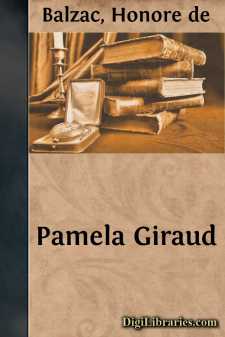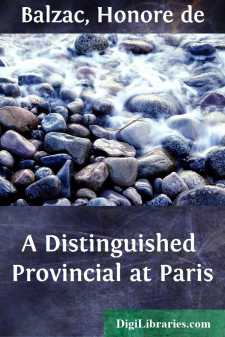Categories
- Antiques & Collectibles 13
- Architecture 36
- Art 48
- Bibles 22
- Biography & Autobiography 813
- Body, Mind & Spirit 142
- Business & Economics 28
- Children's Books 17
- Children's Fiction 14
- Computers 4
- Cooking 94
- Crafts & Hobbies 4
- Drama 346
- Education 46
- Family & Relationships 57
- Fiction 11829
- Games 19
- Gardening 17
- Health & Fitness 34
- History 1377
- House & Home 1
- Humor 147
- Juvenile Fiction 1873
- Juvenile Nonfiction 202
- Language Arts & Disciplines 88
- Law 16
- Literary Collections 686
- Literary Criticism 179
- Mathematics 13
- Medical 41
- Music 40
- Nature 179
- Non-Classifiable 1768
- Performing Arts 7
- Periodicals 1453
- Philosophy 64
- Photography 2
- Poetry 896
- Political Science 203
- Psychology 42
- Reference 154
- Religion 513
- Science 126
- Self-Help 84
- Social Science 81
- Sports & Recreation 34
- Study Aids 3
- Technology & Engineering 59
- Transportation 23
- Travel 463
- True Crime 29
Sort by:
by:
Honore de Balzac
CHAPTER I. PRO AND CON Monsieur de Manerville, the father, was a worthy Norman gentleman, well known to the Marechael de Richelieu, who married him to one of the richest heiresses of Bordeaux in the days when the old duke reigned in Guienne as governor. The Norman then sold the estate he owned in Bessin, and became a Gascon, allured by the beauty of the chateau de Lanstrac, a delightful residence owned...
more...
by:
Honore de Balzac
PROLOGUE Certain persons have reproached the Author for knowing no more about the language of the olden times than hares do of telling stories. Formerly these people would have been vilified, called cannibals, churls, and sycophants, and Gomorrah would have been hinted at as their natal place. But the Author consents to spare them the flowery epithets of ancient criticism; he contents himself with...
more...
by:
Honore de Balzac
EVE AND DAVID Lucien had gone to Paris; and David Sechard, with the courage and intelligence of the ox which painters give the Evangelist for accompanying symbol, set himself to make the large fortune for which he had wished that evening down by the Charente, when he sat with Eve by the weir, and she gave him her hand and her heart. He wanted to make the money quickly, and less for himself than for...
more...
by:
Honore de Balzac
A PASSION IN THE DESERT "The whole show is dreadful," she cried coming out of the menagerie of M. Martin. She had just been looking at that daring speculator "working with his hyena,"—to speak in the style of the programme. "By what means," she continued, "can he have tamed these animals to such a point as to be certain of their affection for——" "What seems to...
more...
by:
Honore de Balzac
ACT I SCENE FIRST (Setting is an attic and workshop of an artificial flower-maker. It ispoorly lighted by means of a candle placed on the work-table. Theceiling slopes abruptly at the back allowing space to conceal a man.On the right is a door, on the left a fireplace. Pamela is discoveredat work, and Joseph Binet is seated near her.) Pamela, Joseph Binet and later Jules Rousseau. PamelaMonsieur Joseph...
more...
by:
Honore de Balzac
CHAPTER I. THE CHALET At the beginning of October, 1829, Monsieur Simon Babylas Latournelle, notary, was walking up from Havre to Ingouville, arm in arm with his son and accompanied by his wife, at whose side the head clerk of the lawyer's office, a little hunchback named Jean Butscha, trotted along like a page. When these four personages (two of whom came the same way every evening) reached the...
more...
by:
Honore de Balzac
AT THE SIGN OF THE CAT AND RACKET Half-way down the Rue Saint-Denis, almost at the corner of the Rue du Petit-Lion, there stood formerly one of those delightful houses which enable historians to reconstruct old Paris by analogy. The threatening walls of this tumbledown abode seemed to have been decorated with hieroglyphics. For what other name could the passer-by give to the Xs and Vs which the...
more...
by:
Honore de Balzac
INTRODUCTION I have sometimes wondered whether it was accident or intention which made Balzac so frequently combine early and late work in the same volume. The question is certainly insoluble, and perhaps not worth solving, but it presents itself once more in the present instance. L'Illustre Gaudissart is a story of 1832, the very heyday of Balzac's creative period, when even his pen could...
more...
by:
Honore de Balzac
PART I Mme. de Bargeton and Lucien de Rubempre had left Angouleme behind, and were traveling together upon the road to Paris. Not one of the party who made that journey alluded to it afterwards; but it may be believed that an infatuated youth who had looked forward to the delights of an elopement, must have found the continual presence of Gentil, the man-servant, and Albertine, the maid, not a little...
more...
by:
Honore de Balzac
HONORINE If the French have as great an aversion for traveling as the English have a propensity for it, both English and French have perhaps sufficient reasons. Something better than England is everywhere to be found; whereas it is excessively difficult to find the charms of France outside France. Other countries can show admirable scenery, and they frequently offer greater comfort than that of France,...
more...











